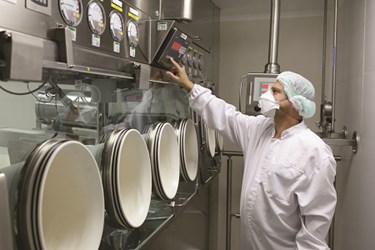Catalent, Minomic Collaborate On Prostate Cancer ADC Treatment

American company Catalent announced plans to collaborate with Australian Minomic in the manufacturing of a new antibody drug conjugation (ADC), MIL-38, to treat prostate cancer.
ADC technology combines the non-toxic advantages of biological cancer treatment with the high potency of chemical drugs. When successful, ADCs work like a heat-seeking missile, which targets cancerous cells and leaves healthy tissue intact.
Brad Walsh, CEO of Minomic, reports that, “Early signs in the study are extremely encouraging.”
Under the terms of the deal, Catalent will employ its proprietary GPEx technology which creates stable, high-yielding mammalian cell lines. Catalent will produce a smaller batch of antibodies for the clinical studies, and if the trials prove successful, are equipped to handle larger scale production.
In 2013, Catalent began construction in Kentucky on a $20M biomanufacturing facility in Winchester, nearly quadrupling the company’s manufacturing area.
ADC’s represent a relatively new but rapidly growing market in oncology research with over 30 clinical trials currently underway.
While the technology is promising, manufacturing has proven to be problematic, and researchers find that it’s often difficult to produce a consistent product. Very few ADC’s have advanced into late-stage clinical trials and only two have been tested in humans.
Nevertheless, ADC’s join an expanding field of experimental prostate cancer research. Cancer.org lists over a dozen new prostate cancer treatments currently undergoing clinical trial. These include: hormone therapy, angiogenesis inhibitors, as well as some developing vaccines, which aim to boost the body’s immune response to cancer cells.
Sipuleucel-T (Provenge), manufactured by Dendreon, is one example of a prostate cancer vaccine which, while it cannot prevent the disease, can train the body’s immune system to recognize and kill cancerous cells. Sipuleucel-T was approved by the FDA in 2010.
In addition to their ADC research, Minomic is also developing a prostate cancer test-kit, which is less invasive than traditional methods and seeks to use the same antibody target as MIL-38.
The American Cancer Society estimates that one in seven men will be diagnosed with prostate cancer during his lifetime. Like with any cancer, the survival rate of prostate cancer is greatly improved by early detection.
